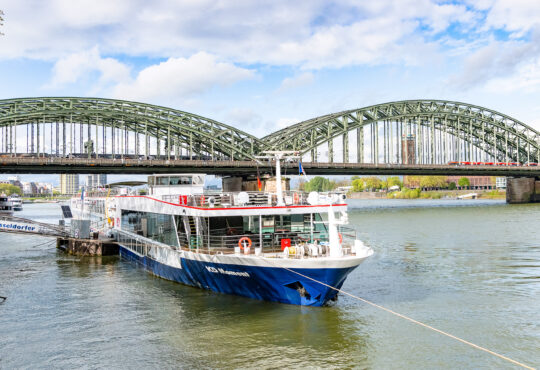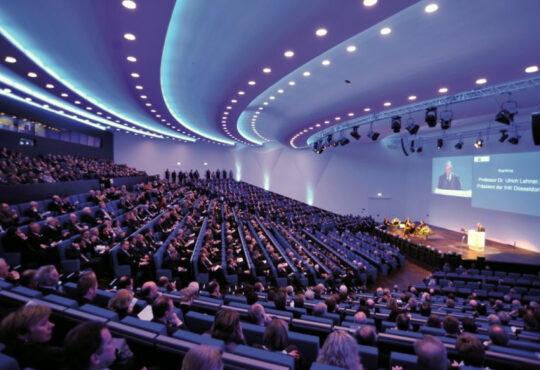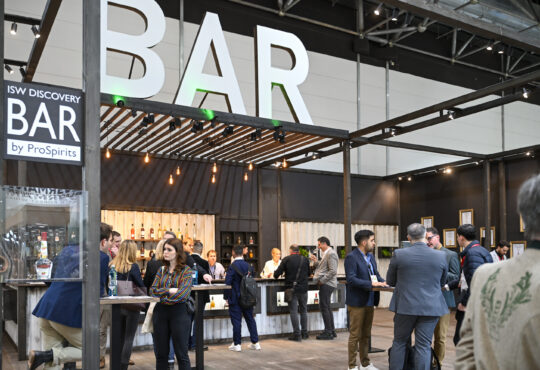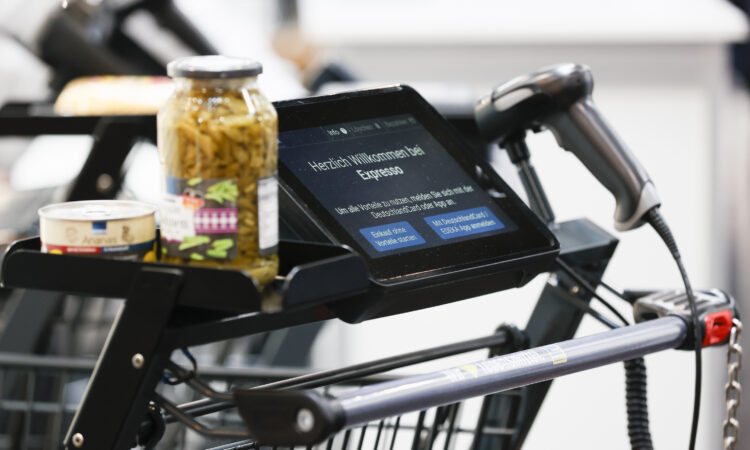
The future is now! The current EuroCIS will be presenting the latest developments in retail technology in Düsseldorf from February 27 to 29, 2024. On show will be, among other topics, the progress made in the field of robotic technology. With the trade show being held concurrently with XPONENTIAL Europe, our new leading European trade show for uncrewed systems and robotic technology, next year, synergies in both segments will be created. Let’s introduce you to three autonomous robotics innovations at this year’s EuroCIS and shed some light on the special link between this trade show and XPONENTIAL.
Retail Automation
The international robotics vendor Coalescent Mobile Robotics from Denmark wants to make life easier for retail store associates by deploying its products to optimize in-store workflows. Delivering on that promise is a fleet of autonomous mobile robots that transport empty or full shopping carts from the storage room to the store and back, thereby saving the staff boring, repetitive tasks. Dubbed Serena, the autonomous mobile robot can move through the aisles at speeds of up to 5 feet per second while transporting loads of up to 550 lbs. It can be adapted to store requirements and easily integrated into the existing infrastructure. It’s controlled by the Frida app, which connects all robots with each other and assigns and coordinates all tasks. These robots elegantly drive around shoppers and staff, demonstrating how robotic technology can make the future of retail more efficient and user-friendly for customers and staff alike.
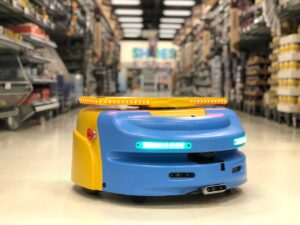
Always at Your Service
The technology provider Almex GmbH specializes in process automation in the retail and logistics, railway and cargo, and public transport industries. At EuroCIS, the Hannover-based enterprise will be showcasing its service robot BellaBot, to name but one product. This innovative “assistant” can also solve such problems as staff shortages or overloading. BellaBot relieves its human colleagues by independently performing such routine jobs as serving without contact and transporting dishes. Four infrared induction sensors register the orders being taken; cameras and one LiDAR sensor make sure it moves around in its surroundings safely, detecting any obstacles. Controllable by voice or touchpad, the service robot completes up to 400 service assignments – 24 hours a day, no less. The battery lasts between 10 and 24 hours and can be exchanged. But BellaBot doesn’t just provide efficient services for us in the food service sector, the technology also has applications in hospitals and offices, at trade shows, and in retail.
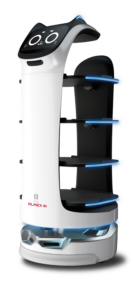
Clean Solution
Cleaning jobs hold a particularly high potential for automation to cut costs and relieve staff. Operating in Germany and Austria, the system integrator FENKA Robotics offers Robotics as a Service (RaaS).
The company checks whether the use of cleaning robots makes economic and process technological sense, supports their integration in cleaning processes, and looks after their smooth operation and maintenance. As a leading vendor of robotic systems for cleaning companies, FENKA’s know-how contributes to the further automation of this industry and helps to spread autonomous robotics technology. FENKA offers full-service robot sales and rentals, independent of manufacturer.
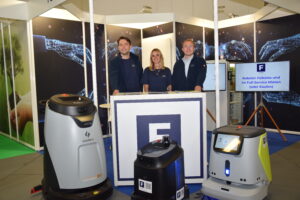
Other Highlights
Under the heading “Go Beyond Today” – next to robotics – AI and machine learning, payments and smart energy management will rank high on the agenda of this year’s EuroCIS. “In the age of digital transformation, retail is not shaped by products alone but also by the power of technology. Here bits and bots come together to shape the future of shopping – a future where technology not only assists but sets the pace of modern transactions,” explains EuroCIS Director Elke Moebius.
Exciting innovations also include Toshiba’s “Vision Kiosk,” which enables payments by face recognition. Customers place their goods on the Kiosk tabletop, which scans the articles and displays the total amount. Payment is then simply done by face recognition powered by PopPay, a biometric face-payment solution.
To make shopping even easier, the German IT provider Pentland Firth Software GmbH offers a smart shopping cart. Prior to shopping at the supermarket, a shopping list is conveniently generated with the Easy Shopper App. At the store, a precise in-cart display helps shoppers navigate to the goods, which are immediately scanned. This makes standing in a checkout line a thing of the past – all thanks to cashierless checkouts and app-based payments.
An important tool for retail also comes care of Ariadne Maps. This Munich-based company uses artificial intelligence to analyze shopper behavior in real time. This technology enables retailers to better understand their customers, identify unnecessary costs and boost sales.
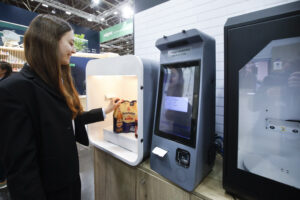
A Perfect Match
All of these examples show just how well the future-focused trade shows EuroCIS and XPONENTIAL Europe will complement each other starting next year. XPONENTIAL – the world-leading trade show for uncrewed systems and robotic technology – has already been held in the U.S. for over 50 years, intersecting not only with retail technology but with a wide range of industries. Last year, the trade show was hosted by AUVSI (Association for Uncrewed Vehicle Systems International) in Denver, Colorado, for the first time with the participation of co-organizer Messe Düsseldorf North America. This year, the world’s experts for uncrewed vehicles and robotic technology will meet in San Diego, California, from April 22 to 25, and next year will see the debut of XPONENTIAL Europe, held concurrently with EuroCIS in Düsseldorf from February 18 to 20, 2025.

Finally, with the drone market offering huge growth potential, drones can also boost retail, as evidenced, for example, by transport, logistics and last-mile deliveries. In 2022, the global market volume for parcel drone deliveries totaled $528 million. This figure is set to climb to $39 billion by 2030. “The future of retail will be characterized in part by the integration of autonomous systems and robotic technology. The synergies between EuroCIS and XPONENTIAL Europe will not only promote innovative technologies, they’ll open the door to forward-looking partnerships and creative solutions for retail,” says XPONENTIAL Europe Director Malte Seifert.





